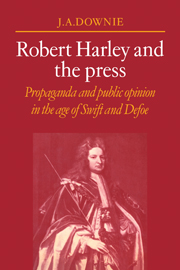Book contents
- Frontmatter
- Contents
- Preface and Acknowledgements
- Author's note
- Introduction
- Part one 1689–1708
- 1 The propaganda of court and country
- 2 The paper war of 1701
- 3 Harley and Defoe
- 4 The Memorial of the Church of England (1705): a case study
- Part two 1708–1714
- Epilogue: impeachment and after
- Abbreviations
- Notes
- Index
2 - The paper war of 1701
Published online by Cambridge University Press: 07 October 2011
- Frontmatter
- Contents
- Preface and Acknowledgements
- Author's note
- Introduction
- Part one 1689–1708
- 1 The propaganda of court and country
- 2 The paper war of 1701
- 3 Harley and Defoe
- 4 The Memorial of the Church of England (1705): a case study
- Part two 1708–1714
- Epilogue: impeachment and after
- Abbreviations
- Notes
- Index
Summary
In 1700 William III rejected the leaders of the court whigs, Somers, Halifax, Orford and Wharton – the group known collectively as the Junto – apparently once and for all. In the autumn of the same year negotiations were on foot between the king and the most prominent members of the opposition in both houses of parliament regarding the succession. As well as Harley, who led the Commons in most things, the talks involved the earl of Rochester and Lord Godolphin (among others). Parliament was dissolved, elections took place, and preparations were made against the opening of the new parliament in February 1701. Harley was elected speaker, supported by both the court party and the country opposition. He was opposed only by those whigs irreconcilable to him, and outside the control of the court. A whig party again existed at the centre of power as a separate entity which could not be classified as either court or country. The New Country Party was now working alongside the permanent courtiers. The whigs could hardly claim to be the country opposition. They were no longer members of the court party. By the end of 1701 the realignment was virtually complete, as political terminology returned to the previous dichotomy between whig and tory in trying to establish accurate terms of reference.
Accompanying the political transformation, contributing greatly to it, and generally symptomatic of a period of flux, was a paper war which was by far the most extensive and the most general since the lifting of censorship.
- Type
- Chapter
- Information
- Robert Harley and the PressPropaganda and Public Opinion in the Age of Swift and Defoe, pp. 41 - 56Publisher: Cambridge University PressPrint publication year: 1979



